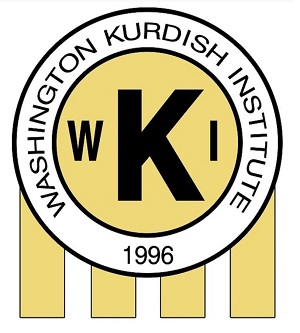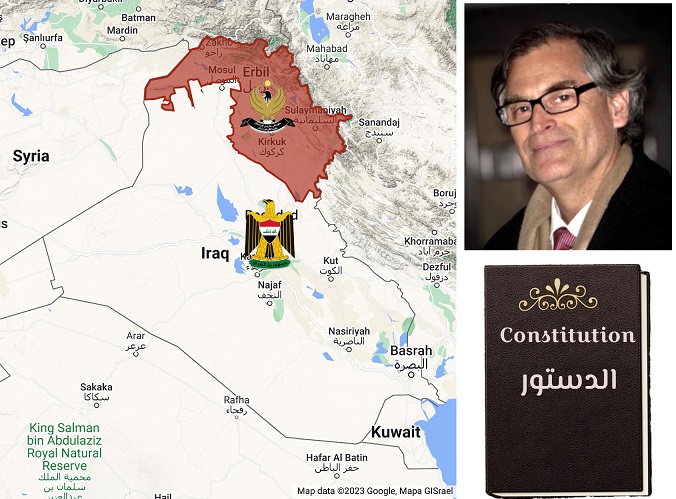Washington Kurdish Institute
By: Vincent Campos | January 17, 2024
Synopsis: Despite the roadmap towards federalism as envisioned in Iraq’s 2005 Constitution, Shia political leaders have endeavored ceaselessly to deflect, deter, and dismantle any actions they deemed a threat to decreasing Baghdad’s central authority. Absent any forward movement to the contrary, implementing Iraqi federalism in accordance with constitutionally-mandated provisions intended to establish power sharing among Baghdad, the governorates, and regions may soon become moot before ever given the opportunity to take hold.
Origins of Modern Federalism in Iraq
With the approval of Iraq’s draft constitution at the end of 2005, new hopes abounded for an Iraq that could finally escape from the debilitating and onerous strong central government that the majority of Iraqis, especially the Kurds, were subjected to during the regime of Saddam Hussein. At last, Iraqis would finally be freed from the shackles of the Saddam era and buoyed by the prospect of a modern federalist Iraq which envisioned stronger and more autonomous provinces and a more secure and prosperous Iraqi Kurdistan Region (IKR). This new Iraq promised to usher a balance of power which would allow for a more representative government at the provincial and regional level especially in terms of budget and local decision making.
Unfortunately, in the intervening years since 2005, Shia-dominated Baghdad either exploited, manipulated, or simply ignored key articles of the constitution which were fundamental to a federalist Iraq. This misguided trend weaponized the Iraqi constitution for political gain and continues through today with alarming affect.
Essential Articles of the Iraqi Constitution
There is no question that the drafting and approval process for the new constitution, guided by Sheikh Humam Hamoudi as the chairman of the parliament’s Constitution Drafting Committee, occurred with remarkable speed and intent. Despite many who argued for a slower and more methodical process, the majority of Iraqi political leaders and the international community agreed that Iraq needed to make a clean break from the debilitating impacts of the Saddam era in order to chart a better course for Iraq as quickly as possible. The new constitution, while not perfect, provided Iraq with a solid foundation to make such a break. The pursuit of federalism would be key to preventing the ill-effects of another dominant central government.
Some key articles within the 2005 Iraqi Constitution formed the crux for this vital transition. Article 112 called for the federal government, in concert with regions and governorates, to develop strategic policies to manage oil and gas and for creating a revenue sharing framework. Commonly referred to as the Hydrocarbons Law, these policies were necessary to address budget inequities between the central government and the provinces including the Kurdistan Regional Government (KRG) in Erbil. Article 140, with its 2007 constitutionally-mandate deadline, represented the best hope for normalizing security and management in Kirkuk and other disputed territories. Finally, Articles 114 and 115 provided a solid basis for framing the overarching intent for implementing federalism throughout Iraq.
Devastating Impact of the Shia Political Majority
Unfortunately, any progress to transform these articles into viable and effective laws were continually blocked by the Shia majority throughout the intervening years.
Iraq’s downward slide started during Nouri al-Maliki’s first term and second terms as Prime Minister until he resigned under pressure due to his failures that lead to the ISIS seizure of nearly one-third of Iraq. During his administration, the Hydrocarbons Law never materialized, the budget remained in disarray, and the disputed boundaries along with the status of Kirkuk remained moribund and were never resolved.
In the absence of a federal Hydrocarbons Law, the Kurds enacted their own law in 2007. That effort was vigorously opposed by Baghdad and was eventually overturned by the Federal Supreme Court in 2022 which declared the Kurdish law unconstitutional. The International Court of Arbitration decision in 2023 sealed the fate for unilateral Kurdish oil exports which has had a devastating impact on Kurdistan’s economy and KRG employee salaries.
Kurdish security also suffered due to the establishment and unchecked expansion of the Popular Mobilization Forces (PMF). The creation of the Muhandis General Company all but guarantees nearly unlimited government funds for PMF coffers. Worse yet, PMF member numbers were substantially increased in the Iraqi budget passed in 2023 which alarmed both the Sunnis and Kurds. What had been intended as a temporary measure for the PMF to augment Iraqi Security Forces in the fight against ISIS has now become a permanent security nightmare.
Kurdish security also suffered a devastating blow when Baghdad-led forces invaded Kirkuk in 2017 to ostensibly quell Kurdish ambitions for independence. This action marked the unmistakable turning point and death knell for the future of Iraqi federalism.
Is Iraqi Federalism Salvageable?
Aside from perseverance, innovation, and sheer determination, the Kurds have a limited range of options to consider. Possible paths could include enhancing political alliances within the IKR and with moderate Sunnis and Shias, encouraging governorates to form regions in accordance with Article 119, establishing a more substantial KRG presence in Baghdad, and holding the central government fully accountable for illegal sovereignty incursions by Turkey and Iran.
A stronger Kurdistan means a stronger Iraq, and the alternative serves no logical purpose. At present, Kurdistan’s future remains hostage to Baghdad’s insatiable hunger for power. Dismantling federalism could become Iraq’s Achilles Heel for lasting peace and prosperity.
Disclaimer: The views expressed here represent those of the author and not necessarily those of the WKI.

